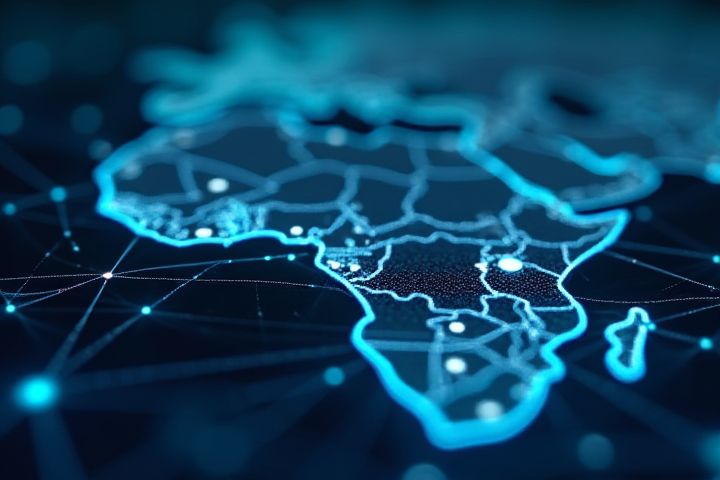
Internet connectivity in Nigeria has seen significant growth, driven by increased mobile penetration and investments in digital infrastructure. As of 2023, over 80 million people in Nigeria are estimated to have access to the internet, predominantly through mobile devices. Major telecommunications providers like MTN and Airtel are expanding their 4G networks, enhancing data speeds and service reliability. However, challenges remain, including limited access in rural areas, high data costs, and regulatory hurdles that can hinder development. Improving internet connectivity is crucial for fostering economic growth, supporting e-commerce, and enhancing educational opportunities for all Nigerians.
Rapidly growing internet penetration
Nigeria's internet connectivity is witnessing rapid growth, driven by increasing mobile phone adoption and affordable data plans. With over 140 million internet users, the penetration rate is approaching 70%, significantly impacting communication, business, and education nationwide. This surge is facilitated by infrastructure improvements, including expanded broadband networks and partnerships with technology companies. You can expect innovative digital solutions to emerge as more Nigerians gain online access, transforming the socio-economic landscape.
Dominance of mobile broadband
In Nigeria, mobile broadband services dominate the internet connectivity landscape, driven by the increasing penetration of smartphones and affordable data plans. Telecommunications companies like MTN, Glo, and Airtel have significantly expanded their infrastructure, enabling millions of users to access the internet on-the-go. The rise of mobile money services and e-commerce platforms further emphasizes the importance of mobile connectivity in facilitating online transactions and fostering economic growth. As a result, Nigeria has become one of the largest mobile broadband markets in Africa, reflecting a shift towards digitalization in various sectors.
Development of 4G and 5G networks
Nigeria's telecommunications landscape is rapidly evolving, with significant investments directed towards the development of 4G and 5G networks. The expansion of these high-speed mobile technologies aims to enhance internet access, boost economic growth, and improve digital services for citizens. With 5G technology enabling faster data processing and reduced latency, industries such as healthcare, education, and agriculture are expected to leverage these advancements for better efficiency and innovation. As Nigeria embraces this digital transformation, seamless internet connectivity will play a crucial role in bridging the digital divide and fostering a tech-savvy society.
Challenges in rural connectivity
Rural connectivity in Nigeria faces significant challenges, primarily due to inadequate infrastructure and limited investment in telecommunications. Many remote areas lack the essential fiber optic cables and cell towers, resulting in poor internet accessibility and speeds. Additionally, the high costs associated with satellite internet services render them unaffordable for the average rural household. To improve internet connectivity in these regions, a concerted effort involving public-private partnerships and innovative solutions, such as community networks, is essential for bridging the digital divide.
High smartphone usage
Nigeria has witnessed a surge in internet connectivity, largely driven by high smartphone usage among its population, which exceeds 200 million. Mobile devices account for over 90% of internet access, enabling millions to engage in social media, online shopping, and digital banking. This increased connectivity is fostering economic growth and creating opportunities in sectors such as e-commerce and fintech, transforming the landscape of communication and commerce. As a result, understanding the dynamics of mobile internet usage is crucial for businesses looking to tap into this vibrant market.
Competitive telecom market
Nigeria's competitive telecom market significantly enhances internet connectivity across the nation, driven by major players like MTN, Airtel, and Glo. This competition fosters innovative services and pricing strategies, making internet access more affordable for millions of users. The proliferation of 4G LTE and ongoing investments in fiber-optic networks further bolster data speeds and reliability. As a result, Nigerians enjoy improved access to digital platforms, promoting economic growth and bridging the digital divide.
Submarine cable landings
Submarine cables are crucial for internet connectivity in Nigeria, facilitating high-capacity data transmission across oceans. The country benefits from several submarine cable systems, including the West African Cable System (WACS) and the Main One Cable, which enhance broadband access and reduce latency. These cables not only connect Nigeria to international markets but also support local telecommunications infrastructure, fostering economic growth and digital innovation. You can explore the impact of these submarine cables on Nigeria's internet speed and accessibility to understand their significance in the digital landscape.
Government policies and regulations
Government policies and regulations play a crucial role in shaping internet connectivity in Nigeria, influencing both infrastructure development and access to digital services. The Nigerian Communications Commission (NCC) has implemented various initiatives aimed at expanding broadband access and enhancing competition among service providers, facilitating improved service quality. In recent years, the National Broadband Plan has outlined a strategy for achieving widespread internet availability, prioritizing underserved regions and promoting affordability. As a result, efforts to simplify licensing processes and encourage foreign investment have generated significant advancements in Nigeria's digital landscape.
Investment in digital infrastructure
Investment in digital infrastructure in Nigeria has significantly enhanced internet connectivity, enabling broader access to online services and information. This growth has driven the expansion of mobile networks and broadband services, making it possible for millions to connect to the internet. The Nigerian government and private-sector stakeholders actively collaborate to improve digital literacy and expand network coverage, particularly in rural areas. As a result, your access to reliable internet not only boosts economic opportunities but also facilitates engagement in global digital trends.
Increasing data consumption trends
Nigeria has witnessed a significant surge in data consumption trends driven by increased smartphone penetration and a growing digital economy. As of 2023, over 100 million Nigerians are estimated to be online, leveraging various internet services such as social media, streaming, and e-commerce. The expansion of 4G and emerging 5G networks has further enhanced connectivity, allowing for faster download speeds and higher data usage across urban and rural regions. For businesses and individuals alike, understanding these trends is crucial for capitalizing on opportunities in the rapidly evolving digital landscape.
